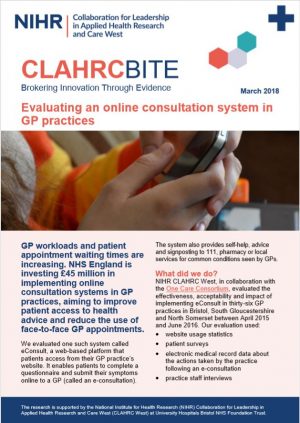ARC West research informs NHS England toolkit for implementing online GP consultations
23 October 2019
NIHR ARC West research has informed the new NHS England toolkit on implementing online consultations in primary care. The toolkit aims to share good practice underpinned by evidence and suggests there’s no “one size fits all” approach to implementing online consultations.
NHS England’s 10-year plan launched in January set out a commitment that all patients in England will have access to a “digital first primary care offer”, such as GP online consultations. The new GP contract agreed between NHS England and the British Medical Association (BMA) gives GP practices almost £1bn over five years to help fulfil the ambitions laid out in the NHS Long Term Plan. This includes all GP practices offering online consultations by April 2020.
Online consultations are seen as a solution to improving patient access to primary care, saving time waiting and travelling, while reducing face-to-face appointments and freeing up GP time. But our research has found that unless these systems are carefully implemented, the benefits of reducing GP workload and increasing the availability of appointments for patients might not be realised.
ARC West researchers, in collaboration with the One Care, conducted one of the largest UK evaluations of online consultations. The study examined the effectiveness, acceptability and impact of implementing a GP online consultation system in 36 GP practices in Bristol, South Gloucestershire and North Somerset. Patients accessed the online consultation system via their GP practice website where they could submit their symptoms via an online form, creating an ‘e-consultation’.
Recommendations for improving the use of online consultations from the research
Online consultations need careful marketing. Online consultations cannot replace face-to-face consultations when diagnosing new or complex symptoms. Practices should consider marketing their online consultations for routine enquiries or follow-up advice. They should discourage their use for more complex enquiries where a face-to-face appointment will probably be needed.
Online consultation systems need to be carefully implemented. GPs who are familiar with the patient and their condition may be better placed to respond to an online consultation, as they might be more aware of the patient’s care needs and can ensure continuity of care. Also, when an online consultation was followed up with a face-to-face appointment, if the GP who initially read the online consultation sees the patient, the consultation could be quicker and more focussed. Practices should, where possible, consider which GPs undertake online and follow-up face-to-face consultations.
Make sure the patient knows what’s happening. Communication channels need to be robust, to make sure that all patients know what’s happening in a timely way, following their online consultation.
Lead researcher Dr Jeremy Horwood, of NIHR ARC West and the Centre for Academic Primary Care (CAPC) at the University of Bristol, said:
“Online consultations have value for some patients, but they cannot replace face-to-face consultations in situations which are more complex. I welcome that the new implementation toolkit highlights that the adoption of online consultations needs to focus on people and not the technology alone, as their implementation must be combined with a new way of working to transform care. Our research demonstrates they need to be carefully implemented and effectively marketed to yield the benefits that politicians are hoping for.”
ARC West and CAPC’s current NIHR School of Primary Care Research funded DECODE study will help guide future technology implementation in primary care, by examining the unexpected consequences of using digital health tools for patients, GPs and practice staff for three popular applications in GP practices:
- Smartphone apps that support patients to monitor and self-manage long-term conditions with their GP
- Online GP consultations
- Online patient access to medical records
Watch the video abstract
ARC BITE
